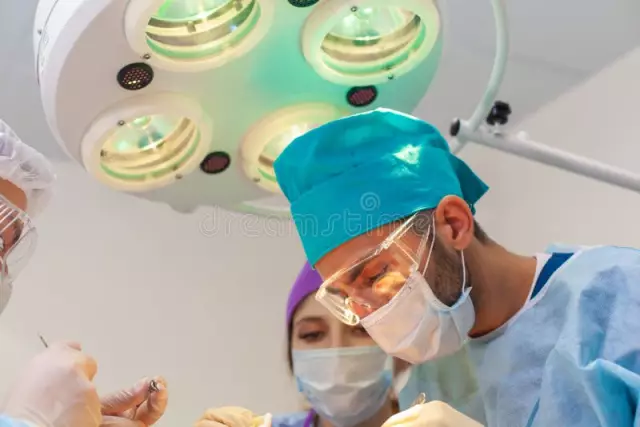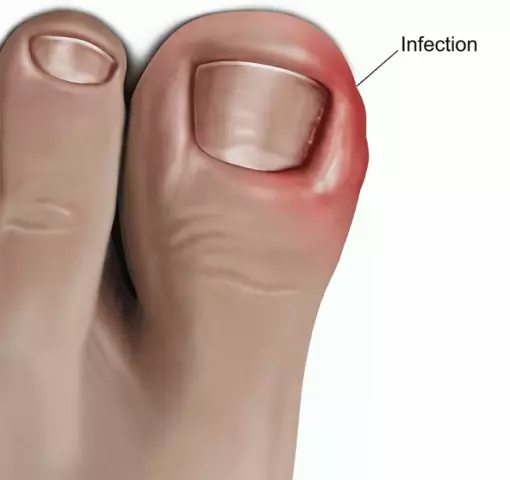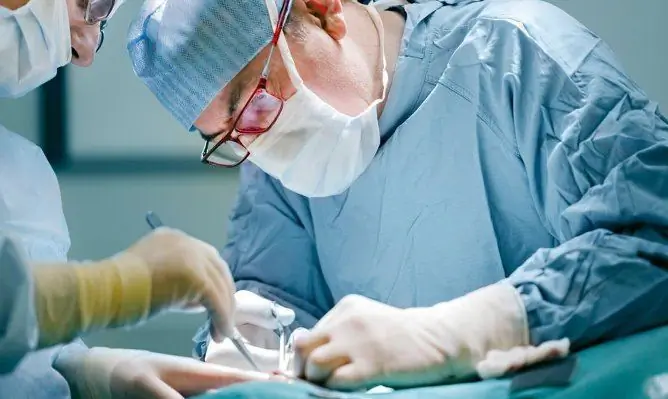- Author Rachel Wainwright wainwright@abchealthonline.com.
- Public 2023-12-15 07:39.
- Last modified 2025-11-02 20:14.
Rectal polyps

Rectal polyps are benign growths that are located on the wall of the rectum and grow into the lumen.
Effects on the body and complications from polyps
The rectal polyp is a tumor-like formation on the pedicle, has a spherical shape and branched growths at the base. Polyps are usually reddish or yellowish in color and covered with mucus, and their consistency is soft and sticky.
If a patient has several polyps in the rectum, then the disease is polyposis. Each polyp of the rectum grows from the epithelium and contains connective bases with muscle tissue.
In medicine, the presence of polyps is considered as a precancerous condition, since each subsequent polyp formed in the intestine can be malignant and cause colorectal cancer.
Benign rectal polyps are classified into the following types:
- by the type of distribution - single, multiple, group and diffuse;
- by morphological features - glandular, villous, plastic and hyperplastic, cystic, fibrous and false.
Rectal polyps can appear in both adult patients and children.
These tumors can lead to the following complications:
- malignant tumors;
- inflammatory and degenerative processes in the rectum;
- diseases of the digestive tract and disorders of the digestive system;
- cracks in the rectum;
- hemorrhoids;
- paraproctitis.
Causes and symptoms of rectal polyps
In modern medicine, the exact causes of rectal polyps have not been established. The main causes of the disease are connective tissue pathologies and chronic inflammatory diseases, including peptic ulcer disease, colitis, enteritis, typhoid fever, dysentery, etc. These diseases cause premature aging of the rectal epithelium and contribute to the appearance of benign tumors. After the complete cure of inflammatory diseases, polypous growths can completely disappear.
In children, the causes of rectal polyps can be congenital pathologies and genetic predisposition.
Symptoms of rectal polyps may not appear for a long time and are difficult to detect in a clinical trial. Often the disease is detected by endoscopic examination.
The main symptoms of rectal polyps are diarrhea mixed with mucus and blood, bleeding from the rectum, frequent urge to defecate, anemia, and exhaustion. A rectal polyp can be impaired by the sphincter during bowel movements and excreted from the rectum in fragments.
Prevention of rectal polyposis
The main measure for the prevention of rectal polyposis is adherence to a special program of nutrition and exercise, especially for elderly patients.

To prevent the appearance of rectal polyps, you must follow these recommendations:
- eat foods that are rich in fiber and vitamins (cabbage, apples, zucchini, pumpkin, cucumbers, kiwi, beets, etc.);
- replace animal fats with vegetable analogues;
- Limit or completely eliminate the use of alcoholic and energy drinks, which increase the risk of developing digestive diseases.
Diagnosis and treatment of rectal polyps
To establish an accurate diagnosis and identify rectal polyps, the proctologist performs an examination and digital examination. The examination can reveal the number of polyps, their size, location and consistency. As an additional diagnostic examination, sigmoidoscopy and X-ray examination are prescribed. X-rays will determine the condition of the colon and the number of polyps, as well as establish the extent of rectal lesions and the nature of the tumors. In some cases, rectal polyps are combined with other tumor formations of the gastrointestinal tract. To determine the condition of the stomach, an ultrasound examination is prescribed.
Treatment of rectal polyps begins with elimination of the causes of tumors and associated diseases of the digestive system. The attending physician prescribes anti-inflammatory drugs, and also conducts regular follow-up examinations, including colonoscopy and sigmoidoscopy.
In most cases, in the presence of rectal polyps, the operation is performed to completely remove the foci of inflammation. The surgeon excises the polyp from the rectum and removes the affected tissue around it.
In severe inflammation and lesions with rectal polyps, the operation is performed with partial removal of fragments of the intestine and its stitching, and, if necessary, completely remove the rectum.
After the operation, the patient undergoes a course of rehabilitation therapy and rehabilitation procedures in a hospital. Stress, injury and intense movement should be avoided for several months.
YouTube video related to the article:
The information is generalized and provided for informational purposes only. At the first sign of illness, see your doctor. Self-medication is hazardous to health!






